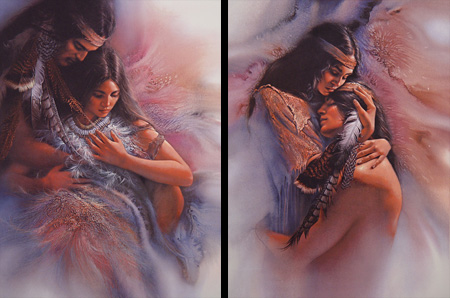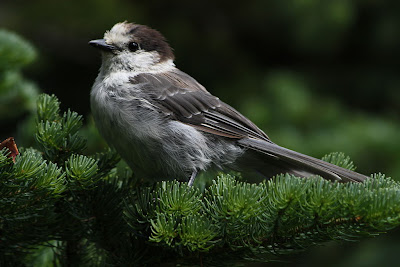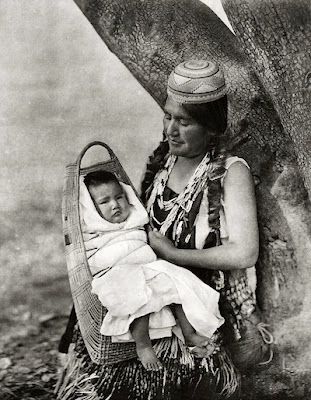Days before
the year the chief had allowed both the daughters to find a husband, the
youngest daughter, Aiyanna, found a man she wished to marry. He was no ordinary
man; he was unkempt and poor. He was unable to leave his bed and required much
assistance to achieve everyday tasks. His name was Sike. The youngest daughter
could tell he had a pure heart and a kind nature. She knew he was the only man
she would want to spend the rest of her life with regardless of his disheveled appearance.
The chief
did not approve of her choice. He said she was his most beautiful and prized
daughter. For her to marry such a man would be a disgrace. He forbade it and
said he would find a more suitable man for her to marry. Heartbroken, she
informed the man she loved of what her father had said.
The chief came
up with a competition and decided that whoever won the competition would get
the honor of marrying both his daughters. The competition to be won was: the man
who could set a trap and catch the rare Pygmy rabbit without killing it would
win the hand of his two daughters. The chief declared that not only would the
men have to catch the rare rabbit, but if they caught nothing on the first day,
they would automatically be removed from the competition. All men that caught
the rabbit on the first day would have to then set one more trap and capture a
different one the next day. The one to catch two first and return to the chief
would win his daughters’ hands in marriage.
When Sike heard
of the conditions of the competition, he decided he would participate and win the
woman he loved. What nobody knew was: Sike had descended from the heavens in
order to find the purest human for him to marry. He disguised himself as a man
that no woman would love unless the woman was willing to look deeper than appearance
and ability. He loved Aiyanna’s pure, kind heart as much as she loved his.
Sike calls
to the heavens to help him win the competition because he cannot win in his
current state. He goes to sleep and when he wakes up in the morning, he finds a
pygmy rabbit trapped in a bush outside his door. The next morning he finds
another rabbit in the exact same spot. Sike tells Aiyanna of his victory and
she triumphantly takes the rabbits to the chief. The chief was outraged and refused
to believe Sike was able to catch the rabbits, and looks for another who was
able to capture the rabbits, but no one else has successfully completed the
task. At this, the chief decides to hold another competition where the winner
will “actually win both the daughters”.
The chief has
an eagle in the trees far on the mountain and declares that the man that is
able to shot the eagle with only two arrows will win his daughters.
Again, Sike
calls to the heavens to provide him with arrows. He aims and prays that the
heavens would guide his arrows. Sike successfully shoots the eagle with a
single arrow. The chief sees the eagle has been shot and is overjoyed. He seeks
out the man who shot it. Once he discovers it was Sike, he is disappointed, but
he does not go back on his word.
The chief
sends his daughters to Sike to marry. On the way the older daughter finds
another man and agrees to marry him; it’s one of her previous interests. She
refused to marry the dirty, bed ridden man. The younger daughter is delighted
that he has won and she will get to spend the rest of her life with him.
The other
sisters make fun of her having to live with a dirty gross man, but she knows in
her heart she loves him and any other man could never have been as good as he.
Ayianna nurses Sike and takes care of him.
One day she
returns to Sike’s home from visiting her father to find the once poor, grungy
house is now full of treasures and riches. She does not understand where her
house went. She enters the new place to find a beautiful man lying where her
husband had lain. Aiyanna is full of confusion. The beautiful man turns over
and motions to her. He is Sike, her husband. The heavens had changed him back
to his true form which happens to be the most beautiful human with a plethora
of riches. The youngest daughter cares for none of this, but her sisters now
know the importance of looking further than skin deep.


Author's Note: I read Native American Hero Tales from Stith Thompson's anthology and really enjoyed the last story in this storybook. I also read American Indian Fairy Tales by W.T. Larned the week before. They both had a story that had a similar theme and moral. I really liked both of the stories about the dirty boy being unloved then loved and becoming beautiful.



